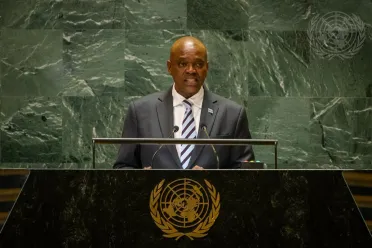Statement
Statement summary
MOKGWEETSI E.K. MASISI, President of Botswana, evoking a backdrop of interlinking crises exacerbated by geopolitical tensions and compounded by the Israel-Hamas war, condemned attacks on innocent civilians and voiced concern for the situation in Gaza. Voicing further concern over the deaths of United Nations Relief and Works Agency for Palestine Refugees in the Near East (UNRWA) employees and hailing their work, he said, “We owe them a debt of gratitude, and they deserve our full protection.” Moreover, Botswana “abhors” attacks on UNRWA’s structures and “condemns disinformation and misinformation campaigns against this life-saving General Assembly-mandated Agency”. His country is proud to have joined the Statement of Shared Commitments on UNRWA, he said, reiterating Botswana’s position on the importance of the two-State solution based on the 1967 borders to establish peace.
Meanwhile, the war in Ukraine rages in disrespect of its territorial integrity, he added, calling on the parties to use diplomacy to seek a peaceful resolution. Africa also continues to grapple with armed conflict and terrorism. In that vein, Botswana commends the efforts of the African Union and the UN to address such challenges and welcomes the adoption of Security Council resolution 2719 (2023) on support to African Union-led peace operations. In this time of conflicts and violence, international law must be respected, namely the principle of the responsibility to protect. Peace will not be achieved if left only to multilateral bodies. Governments must create conditions for peace within their own countries through building effective intuitions and committing to good governance in line with human rights and democratic values.
“Regrettably, while on the one hand, the scourge of war rages on, on the other hand, the promise of sustainable development is in great peril,” he said, noting that only 17 per cent of the SDGs are on track. However, inspiration can be taken from successes such as a reduction in global child mortality, fewer HIV infections and greater parity in childhood education. “Poverty eradication is the sine qua non of sustainable development.” However, comprehensive social protection and “pro-poor policies” must be complemented by those that facilitate growth and sustainable employment. To leave no one behind, Botswana calls for “predictable, sustainable and sufficient development finance to developing countries from all funding sources”.
On the climate crisis, he said that his subregion of Southern African has experienced droughts and floods with devastating effects on over 61 million people. SADC reiterates its appeal for $5.5 billion to bolster domestic resources of the States affected by the impacts of El Niño. “I cannot overemphasize the need for adequate climate finance for effective climate action,” he urged, reminding developed countries of their annual $100 billion commitments and calling for more ambitious goals going forward. Both as a landlocked developing country and as Chair of the Group of Landlocked Developing Countries, Botswana remains deeply concerned by growing obstacles to the 2030 Agenda, he said, highlighting that the group of countries are often cut off from global trade without sea access, which poses challenges in the development of infrastructure. The forthcoming Third UN Conference on Landlocked Developing Countries in his country will be an opportunity to address these challenges, he said, inviting transit countries to participate.
Full statement
Read the full statement, in PDF format.
Photo

Previous sessions
Access the statements from previous sessions.
